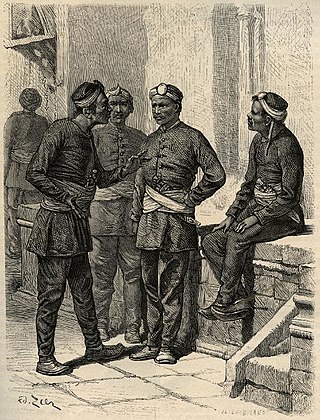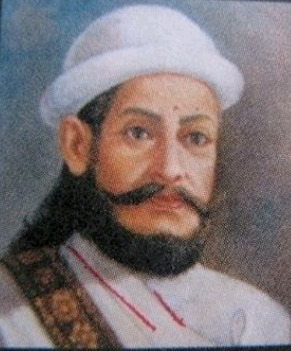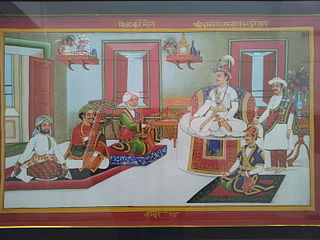
The Kingdom of Nepal was a Hindu kingdom in South Asia, formed in 1768 by the expansion of the Gorkha Kingdom, which lasted until 2008 when the kingdom became the Federal Democratic Republic of Nepal. It was also known as the Gorkha Empire, or sometimes Asal Hindustan. Founded by King Prithvi Narayan Shah, a Gorkha monarch who claimed to be of Thakuri origin from chaubisi, it existed for 240 years until the abolition of the Nepalese monarchy in 2008. During this period, Nepal was formally under the rule of the Shah dynasty, which exercised varying degrees of power during the kingdom's existence.

The Gurkhas or Gorkhas, with the endonym Gorkhali, are soldiers native to the Indian subcontinent, chiefly residing within Nepal and some parts of North India.

The Magars, also spelled Mangar and Mongar, are Magar are Tibeto-Burman ethnic group native to Nepal, representing 6.9% of Nepal's total population according to the 2021 Nepal census. They are one of the main Gurkha tribes.

The Gorkha Kingdom was a member of the Chaubisi rajya, a confederation of 24 states, located at the intersection of Himalayas and the Indian subcontinent. In 1743 CE, the kingdom began a campaign of military expansion, annexing several neighbors and becoming present-day Nepal.

Karanbahadur Rana Magar VC was a Nepalese Gurkha recipient of the Victoria Cross, the highest and most prestigious award for gallantry in the face of the enemy that can be awarded to members of British and Commonwealth forces.

Amar Singh Thapa distinguished as Badakaji Amar Singh Thapa(Nepali: बडाकाजी अमर सिंह थापा), or Amar Singh Thapa The Elder, also known by the honorific name Bada Kaji or Budha Kaji, was a Gorkhali military general, governor and warlord in the Kingdom of Nepal. He was the overall commander of the Nepal Army in the conquest of Western Provinces and authoritative ruler of Kumaon, Garhwal in the Kingdom of Nepal. He was referred by the King of Nepal to have been deployed as Mukhtiyar of Western Provinces of Kumaon, Garhwal. He is often hailed as Living Tiger of Nepal and was posthumously regarded as one of the national heroes of Nepal, who led the Anglo-Nepalese War for the Gorkhali Army. Amarsingh Chowk Pokhara and Shree Amarsingh Model Higher Secondary School are named after Amar Singh Thapa.

The Shah dynasty, also known as the Shahs of Gorkha or the Royal House of Gorkha, was the ruling Chaubise Thakuri dynasty and the founder of the Gorkha Kingdom from 1559 to 1768 and later the unified Kingdom of Nepal from 1768 to 28 May 2008.

The unification of Nepal was the process of building the modern Nepalese state, from fractured petty kingdoms including the Baise Rajya and the Chaubisi Rajya, which began in 1743 AD. The prominent figure in the unification campaign was Prithvi Narayan Shah, King of Gorkha. On 25 September 1768, he officially announced the creation of the Kingdom of Nepal and moved his capital from Gorkha to the city of Kathmandu.

Chhetri, historically called Kshettriya or Kshetriya or Khas are Nepali speaking Rajputs of Khas community, some of whom trace their origin to migration from medieval India. Chhetri was a caste of administrators, governor and military elites in the medieval Khas Kingdom and Gorkha Kingdom. The nobility of the Gorkha Kingdom mainly originated from Chhetri families. They also had a strong presence in civil administration affairs. The bulk of prime ministers of Nepal before the democratization of Nepal belonged to this caste as a result of the old Gorkhali aristocracy. Gorkha-based aristocratic Chhetri families included the Pande dynasty, the Basnyat dynasty, the Kunwar family, and the Thapa dynasty,.

Thapa (pronunciation:) is an Indo-Aryan surname belonging to the Chhetri caste (Rajput) in Nepal and parts of Northern India. It is also used by the Magar group, a Sino-Tibetan speaking ethnicity.

Sir Baber Shumsher Jung Bahadur Rana, GCVO, GBE, KCSI, KCIE was a member of the Rana dynasty who served as the Minister of Defence of Nepal in 1951. A prominent member of the Rana oligarchy, he fought valiantly in the First World War. He was the second son of Maharaja Sir Chandra Shamsher Jang Bahadur Rana and Bada Maharani Chandra Loka Bhakta Lakshmi Devi. He was the younger brother of Maharaja Sir Mohan Shamsher Jang Bahadur Rana and older brother of Field Marshal Sir Kaiser Shamsher Jang Bahadur Rana.
Commander in Chief Kiran Shamsher Jang Bahadur Rana (1916–1983) was a Nepalese army officer. He served as the Royal Nepalese Army's Commander-in-Chief from 1951–1956 and as the Nepalese ambassador to the United Kingdom from 1973–1977. Over the course of thirty years, he served as Aide-de-camp General to King Tribhuvan, King Mahendra and King Birendra.

Kaji was a title and position used by nobility of Gorkha Kingdom (1559–1768) and Kingdom of Nepal between 1768 and 1846. Many other contemporary kingdoms used the same title for their ministers.

Mitrasen Thapa Magar, popularly known as Master Mitrasen, was a singer and songwriter of Nepali folk music from Dharamshala, India. He was also a dramatist and social worker. Leaving the Indian Army in early age for the upliftment of Nepali music, his contribution to different fields of Indian Gorkha and Nepalese society is remarkable.
Ganesh Pandey or Ganesa Pande
The Kunwar family was a noble Khas-Chhetri family in the Gorkha Kingdom and the Kingdom of Nepal. The Kunwars were linked to the Thapa dynasty and family of Amar Singh Thapa by marital lineages and, thus, to Pande dynasty through the Thapa dynasty. Three branches of the Kunwars; Ramakrishna, Jayakrishna and Amar Singh Kunwar were formed with opposite political aspirations. Bal Narsingh Kunwar supported Mukhtiyar Bhimsen Thapa while Chandrabir Kunwar supported Bada Kaji Amar Singh Thapa due to their marital relations with those families. Later, the Ramakrishna section of the family including Amarsingh established the Rana dynasty of Nepal and styled themselves as Rana Rajputs while Jayakrishna most section remained as Kunwars.

The family of Badakaji Amar Singh Thapa was a noble Chhetri family in the central politics of Kingdom of Nepal as well as former military aristocracy of the Gorkha Kingdom. The family of Bhimsen Thapa and the family of Amar Singh Thapa were two Bagale Thapa families and part of the larger Thapa caucus at the central politics of the Kingdom of Nepal.
Battle of Khurbura or Battle of Khudbuda also known as Gorkha-Garhwal War occurred in May 1804 near modern-day village of Dehradun, Khurbura 30.3256°N 78.0267°E. The battle is regarded as the first major attack in the history of Garhwal Kingdom that triggered between Kingdom of Nepal forces and Maharaja Pradyumna Shah, and continued for 13 days until the Garhwal king was defeated. It is chiefly regarded the only defeat of Pradyumna Shah's life and the victory of Gorkhali forces under Kingdom of Nepal.

The Battle of Nuwakot also called Siege of Nuwakot or Invasion of Nuwakot was fought in Nuwakot in 1744. Nuwakot was controlled by the Kingdom of Kantipur and it was an important location as it had a trade route to Tibet. The Gorkha Kingdom previously attacked twice by Nara Bhupal Shah and his son Prithvi Narayan Shah respectively. To prepare for the war Prithvi Narayan Shah visited Varanasi to get war materials, ammunition, acquire weapons, train the soldiers, and Pilgrims. He improved his army personnel and included people from any caste including the blacksmiths, cobblers, sweepers, Damai, and anyone who was bodied and physically fit was able to join the crew.

Major General Siri Kanth Korla, PVSM, DSO, MC was a general officer in the Indian army who served in the Second World War and the Indo-Pakistan War of 1965. He served in the British Indian Army from 1934 to 1947, and the Indian Army from 1947 to 1971. Korla was known as one of the great company commanders of the Burma Campaign, and among the most highly and heavily decorated Indian officers of the British Indian Army during the Second World War.















